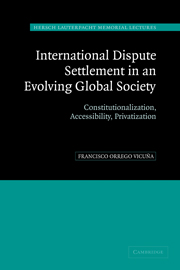 International Dispute Settlement in an Evolving Global Society
International Dispute Settlement in an Evolving Global Society Book contents
- Frontmatter
- Contents
- Preface
- Acknowledgements
- List of abbreviations
- Table of treaties
- Table of cases
- 1 An evolving international society: institutionalization, privatization, globalization
- 2 A constitutional court for an international society?
- 3 Individuals and settlement of international claims: change and adaptation of governing rules
- 4 Individuals before international courts and tribunals: a continuing progression
- 5 Shaping a new role for the individual in international dispute settlement: the contribution of specialized jurisdictions
- 6 The World Trade Organization integrated dispute settlement system: innovation and transition
- 7 An alternative dispute resolution system for international disputes
- 8 A centralized-decentralized dispute resolution system for the international community?
- Bibliography
- Index
1 - An evolving international society: institutionalization, privatization, globalization
Published online by Cambridge University Press: 04 August 2010
- Frontmatter
- Contents
- Preface
- Acknowledgements
- List of abbreviations
- Table of treaties
- Table of cases
- 1 An evolving international society: institutionalization, privatization, globalization
- 2 A constitutional court for an international society?
- 3 Individuals and settlement of international claims: change and adaptation of governing rules
- 4 Individuals before international courts and tribunals: a continuing progression
- 5 Shaping a new role for the individual in international dispute settlement: the contribution of specialized jurisdictions
- 6 The World Trade Organization integrated dispute settlement system: innovation and transition
- 7 An alternative dispute resolution system for international disputes
- 8 A centralized-decentralized dispute resolution system for the international community?
- Bibliography
- Index
Summary
The changes in international society during the twentieth century have clearly established a pattern of evolution from the traditional forms of inter-state relations to an increasingly institutionalized community of nations. Hedley Bull identified five main features of international society as being characteristic of the Grotian tradition: the central place of natural law; the universality of international society; the role of individuals and non-state groups in such society; solidarism in the enforcement of rules; and the absence of international institutions. A number of these features are still shaping modern international society, thus providing a background of continuity to the changes taking place, changes which will now be reviewed.
Increasing institutionalization
Many changes have intervened in the organization of international society in the last few decades, while various aspects of the traditional arrangements continue to influence the shaping of this evolution. It should be noted first that, irrespective of past doctrinal discussions about natural and positive law, it is a fact that most contemporary developments are inspired by the need to ensure human freedom, dignity and welfare, aims inextricably related to our shared humanity. It is next apparent that international society adheres to the ideal of universality, despite powerful recent trends towards regionalism. Although this has prompted occasional tensions and competition between centralized international action and the role of regional organizations, universality and regionalism are generally complementary features of international society.
- Type
- Chapter
- Information
- International Dispute Settlement in an Evolving Global SocietyConstitutionalization, Accessibility, Privatization, pp. 1 - 9Publisher: Cambridge University PressPrint publication year: 2004
